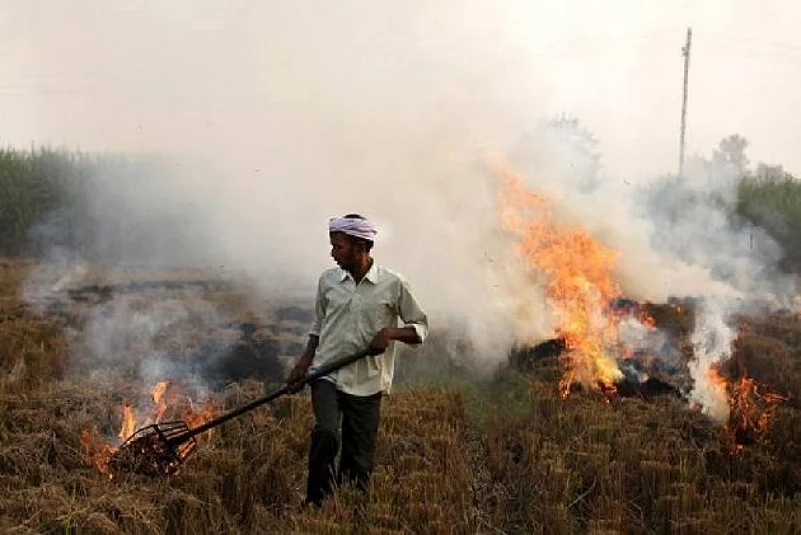Even as Delhi continues to grapple with deteriorating air quality, especially post-Diwali, Punjab and Haryana have recorded an increase of at least 2,400 farm fires--a major contributor to the air pollution in the national capital--till October 27, according to government data.
The Ministry of Earth Sciences' air quality monitor, SAFAR, on Monday predicted that the share of smoke from stubble burning in Delhi's PM 2.5 concentration is likely to jump to 25 percent on Tuesday. It was 15 percent on Monday.
The number of farm fires surged despite the central government issuing strict directions to Haryana and Punjab last week to stop stubble burning completely.
Most cases of paddy residue burning were reported in the last four days, according to data from the pollution control boards of Punjab and Haryana.
Punjab reported an increase of around 25 percent in farm fires.
According to data from the Punjab Pollution Control Board (PPCB), the state recorded 9,600 incidents of stubble burning till October 27 last year. This year, the figure has shot up to 12,027.
Tarn Taran alone has reported 1,863 incidents of farm fires. Ferozpur and Patiala have recorded 1,248 and 1,236 cases, respectively.
A significant rise in stubble burning was recorded on October 26 and 27. While 2,805 cases were reported on October 26, the number on October 27 touched the 2,231 mark.
Haryana witnessed 3,735 farm fires as compared to 3,705 last year.
Karnal, Kaithal and Kurukshetra have reported 824, 818 and 645 incidents of stubble burning, respectively, till October 27.
The System of Air Quality and Weather Forecasting and Research on Monday said, "Haryana and Punjab stubble fire counts are increasing, and the transport level wind direction is favourable for plume transport (northwesterly). The biomass-related contribution may touch this year's peak value (~25%) on October 29."
The period between October 15 and November 15 is considered critical as a maximum number of stubble burning incidents takes place in this span in Punjab and adjoining states and is one of the main reasons for the alarming spike in pollution in Delhi-NCR.
Despite a ban on stubble burning in Punjab and Haryana, farmers continue to defy it because of lack of financial incentives.
State governments are providing 50 to 80 per cent subsidy to farmers and cooperative societies to buy modern farm equipment for in-situ management of paddy straw and running a massive awareness campaign against stubble burning.
A Punjab government official had told PTI that the high court's September 19 order, staying the recovery of fine from farmers found violating the ban on stubble burning, has subdued the effect of challans.
However, Karunesh Garg, member-secretary of the Punjab Pollution Control Board, said the court had only stalled the recovery of fine imposed in previous years and that the government is issuing challans this year.
Secretary (Agriculture) KS Pannu said the number of farm fires seems large because of early harvesting of paddy crop.
"This year, the harvesting began around a week earlier as compared to the last year. That's the reason the number of farm fires looks big. I am sure the cumulative figure at the end of the harvesting period will be much smaller," he said.
The Centre and the state government have made serious interventions, provided farm equipment and undertaken massive awareness drives to prevent stubble burning.
If not this year, the problem will be completely resolved in the next two years, Pannu said.
Haryana Pollution Control Board Member Secretary S Narayanan said around 200 challans have been issued against farmers for violating the ban on stubble burning, but the recovery of fine has been put on hold following the high court order.
















